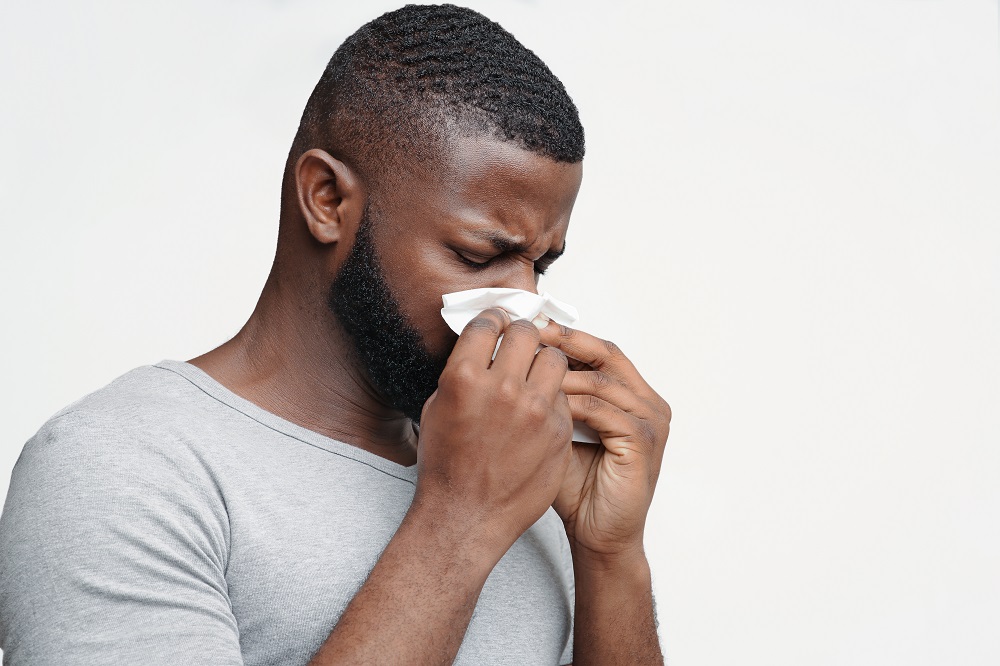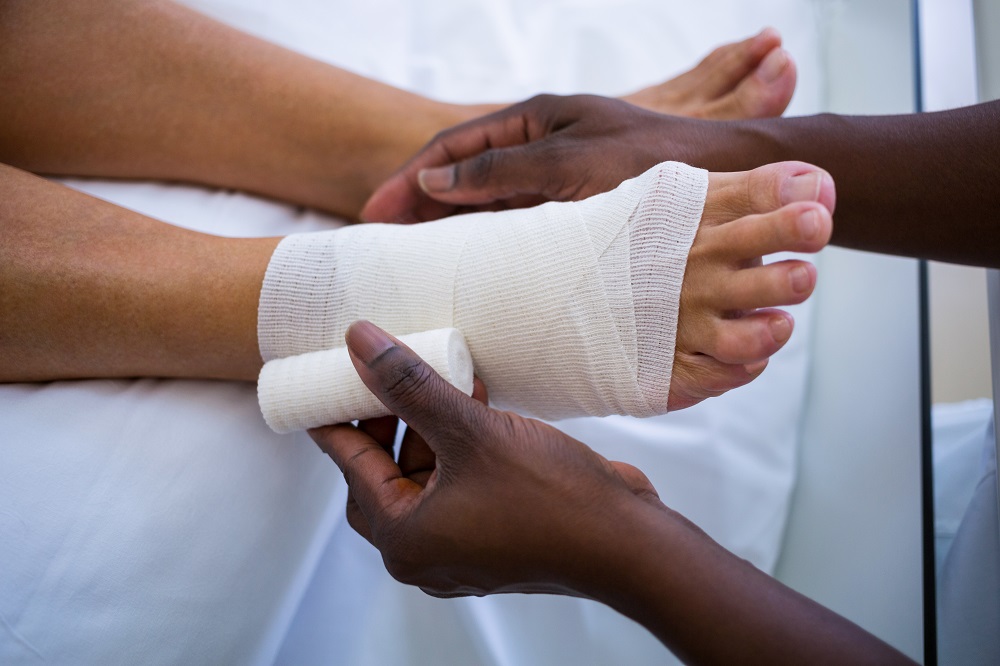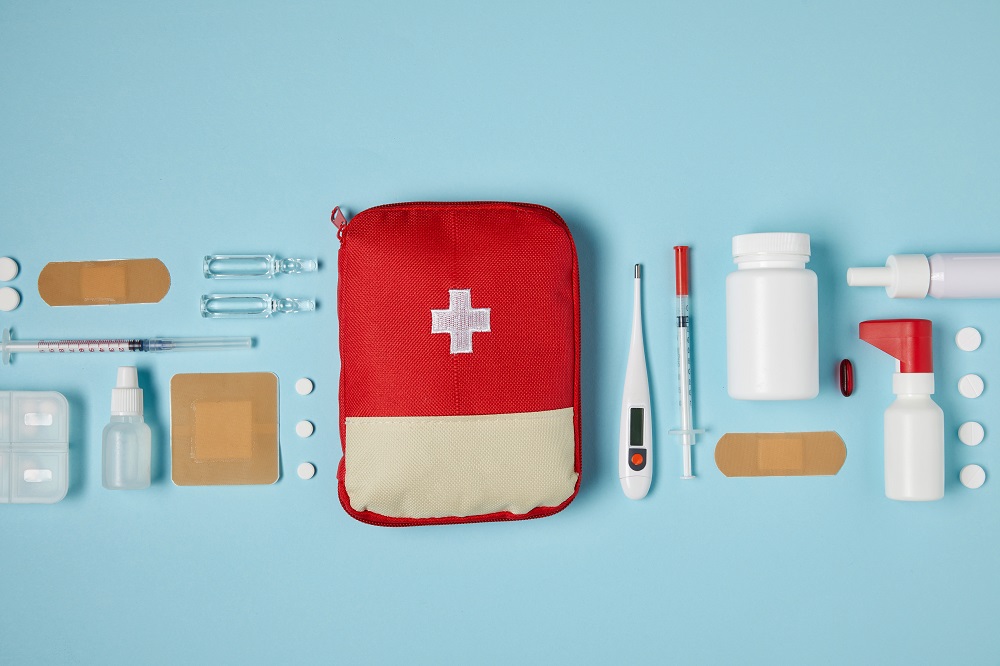Epistaxis, also known as a common nosebleed, is characterized by bleeding from the nasal mucus membranes. More simply put, a nosebleed is bleeding from the tissue inside the nose.
While a nosebleed can look pretty scary, they are minor and will stop on their own in most cases. Sometimes blood can go down the throat and into the stomach, which can cause nausea and vomiting. Usually, nosebleeds come from a single nostril, but in some cases a patient may bleed from both nostrils.
Epistaxis can be dangerous in extreme cases. These include if the bleed is so significant, the patient’s blood pressure drops. Or, in very rare cases, the blood can make its way up the nasolacrimal duct and come out from the eyes.
But don’t worry! About 60% of people in the United States have experienced a nose bleed in their life. And only 10% of nosebleeds are serious.
Most nosebleeds are entirely harmless and can be managed at home. In this article, we are going to discuss a few steps to stop a nosebleed.
First, let’s have a look at the most common causes of a nosebleed.
What Causes A Nosebleed?
The nose has a complex vascular system. This allows a rich supply of blood to circulate through the nose but also means it is more susceptible to bleeding. Combined with the fact that the nose protrudes from the face, in a vulnerable position, it is easy to get a nosebleed if you are hit in the face.
Epistaxis can also occur spontaneously as a result of dryness inside your nose. This is often caused by living in a dry climate or using a central heating system. Dry air can cause the nasal membrane to dry out and crack. People living in dry, hot climates like deserts are more likely to get nosebleeds.
Nosebleeds are also more common in cold winter months when the air is dry, people are using central heating, and respiratory tract infections are common. These factors can be aggravated during the winter when you step inside. The temperature and air difference from the cold outdoors into a warm, dry, and heated home can make the nose more susceptible to bleeding.
Who Gets Nosebleeds?
Nosebleeds tend to be more common in children 2 – 10 and adults over 50, but anyone can get a nosebleed. Some key risk factors contribute to more frequent nosebleeds.
Injury to the nose, including nose-picking, can cause epistaxis. This is often why nosebleeds are common in children.
People who use blood-thinning medications like aspirin, warfarin, etc., are more likely to get a bloody nose when trauma occurs.
Recurring nosebleeds are sometimes caused by allergies, especially allergic rhinitis and other allergic reactions that affect the nasal passages. People who experience non-allergic rhinitis are also at increased risk.
Although not common, people with hypertension may experience more frequent nosebleeds. The use of anticoagulant medications, including aspirin, warfarin, etc., puts patients at a higher risk of bleeding, including nosebleeds.
More uncommon reasons for nosebleeds include tumors, hormonal changes during pregnancy, and Hereditary Hemorrhagic Telangiectasia (HHT). If you are concerned that you or your loved ones’ epistaxis is related to these severe reasons, contact a healthcare professional.
How Can I Stop a Nosebleed?
Here is a step-by-step first aid guide if you or your loved one experiences a nosebleed.
1. Keep Calm
The first step is to remain calm. Nosebleeds may look scary, but in most cases, they can be treated at home. If your child gets a nosebleed, reassure them and help them to keep calm.
2. Sit Upright and Lean Forward
Although the patient may want to lean a bit back to avoid blood dripping from their nose, leaning backward actually causes blood to flow down the throat and sinuses. This can cause nausea and vomiting and exacerbate the situation.
To avoid this, don’t lean back or lie down. Instead, sit upright and lean forward. This will prevent the blood from going down the throat. Use a tissue, towel, or washcloth to catch the blood.
Focus on breathing from the mouth and not from the nose.
3. Avoid Packing Your Nose
The most common mistake people make is packing their nose with a tissue, cotton pads, cloth, or even tampons. Packing the nose may irritate the blood vessels, and it doesn’t allow a natural pressure build-up to occur.
A natural build-up will stop the bleeding more effectively than packing the nose. Try using a tissue or a damp washcloth to collect the blood flowing out from the nose.
4. Use a Decongestant Spray
Nasal decongestants are over-the-counter medications typically used to relieve nasal congestion and inflammation in the upper respiratory tract.
During a nosebleed, you can spray a decongestant into the bleeding nostril. The decongestant will tighten the nostril’s blood vessels and help stop the bleeding.
Never use a nasal decongestant spray for more than a few days as they may worsen congestion and bleeding.
5. Use a Firm Pinch
Try pinching the soft and fleshy parts of the nose below the nasal bones. Continue this for at least 10 minutes. This will compress the blood vessels and ultimately stop the bleeding.
Set a timer, and don’t release the pressure until the ten minutes are over; otherwise, you’ll have to start again.
6. If All Else Fails
If your nose doesn’t stop bleeding even after following the above steps, it’s still not time to worry! Take a cotton ball and soak it with a decongestant solution. Place the cotton ball into the bleeding nostril and compress for 10 minutes.
And don’t forget to give it time. As we’ve discussed, nosebleeds can look scary because there are so many blood vessels in the nose, so there may be a lot of blood lost. Relax and give your nose a little time to clot and stop bleeding.
Avoid Exertion And Strain
It may take your nasal passages a week or two to heal completely from a nosebleed, depending on the epistaxis’s severity. Try to avoid physical strain like exercise and lifting heavy things such as groceries, babies, or heavy boxes. It’s a great excuse to take a break from strenuous household chores for a week or so.
When Should You Seek Professional Help?
If your nose is still bleeding after 20 to 30 minutes of applying pressure, it’s time to seek urgent care. A medical professional will analyze your nose and nasal passages to determine if there are any out of the ordinary causes of bleeding. This could include small nasal polyps, a foreign body, or large blood vessels.
Your medical professional will choose an approach to control your nose bleeding. This could be cautery, medications, or trauma correction. In some serious issues, your medical professional may recommend an endoscopy.
If you have persistent or frequent nosebleeds that cannot be managed at home, CityHealth Urgent Care offers the best emergency treatment for epistaxis and other medical emergencies.
Our team of highly qualified and professional medical experts is here to answer all of your questions and provide fast and efficient care for you and your loved ones. Whether it’s a nosebleed, dog bite, upset stomach, injury or chronic illness, or COVID-19 testing, the experts at CityHealth Urgent Care are committed to helping you heal.
We accept appointments and walk-ins. Book an appointment or a virtual visit today, or contact us.




